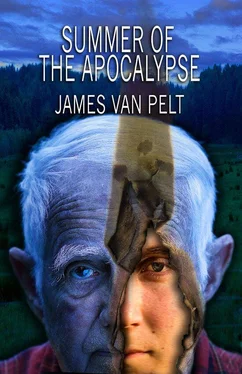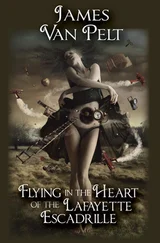“No place will be safe, Leda. We’ve got to outrun it.” They hopped the brick wall. Leda recovered her pack and sleeping bag, shoving her arms into the straps.
She breathed hard, but not panicked. “The wind’s forty or fifty miles an hour. It’ll catch us.” A piece of plywood large enough to cover a picture window blew across the lawn behind her and splintered in two against a light post.
“Listen,” Eric said. He grabbed her arm. She tensed as if to pull away, then relaxed. The sound of a few more explosions reached them. Probably gas tanks, he guessed. Leda’s dark hair streamed in front of her face. She cleared it away impatiently. Eric continued, “We don’t have to run far.” He pulled her along with him. “The Platte River is a half-mile, maybe less. If we can get to that, we’ll be safe.” She looked over her shoulder, nodded and started running down the street. Eric followed. For a block he kept up with her, his long legs matching her efficient jogger’s rhythm, then he stumbled and almost fell. She didn’t see him, and he regained stride. His legs were like rubber, and he remembered he hadn’t eaten anything decent for… he couldn’t come up with the last full meal he’d had, but it must have been at the cave. Since then he’d had a few handfuls of beef-jerky, a couple of cans of peaches, some Oreos and Twinkies from the Wal-Mart, and that was it.
The street dropped down a hill and through an intersection. Eric looked both directions as he crossed under the dead traffic signal. Then Bowles Avenue angled left. Leda turned with the street, and Eric stopped himself from yelling at her to go straight. He figured the river must be just beyond those houses, but he wasn’t sure. Maybe the river curved, or, more likely, the fences and hedges would slow them down more than the distance to the water they’d cut off. He kept running.
Two blocks later sparks flew overhead, and he glanced back. He almost fell again, watching the treetops. Flame and smoke hid the center of the four-lane street a few hundred yards behind them, and he guessed that the house they’d stood on was already burning, but what was happening to the trees caught his attention now. Like long-fingered hands unclenching from fists, the wind stretched balls of flame from one tree to the next. For a second, the flames caressed the next victim, then the green tree burst into yellow, sickly light. Eric gasped at the sight and took in a lung full of caustic air. All the ornamental oaks, the willows and aspen, the birch and pine planted on the expensive front yards in little stands of three or four, lined along the property lines like sentinels, unwatered and dry as tinder, provided jump points for the fire.
Wind creaked the trees’ branches as he ran, and he realized that the closer they got to the river, the thicker the trees were.
A house behind a low brick wall and across a long stretch of lawn directly to his left exploded. A billow of white and orange pushed the windows out, throwing a piece of the roof into the sky. “What?” Eric yelled in surprise. There wasn’t fire within four blocks of them yet. Then he tripped. Pavement rose toward him. He saw it coming, and he rolled his shoulder. As he fell, he thought, I’ve got to bounce right up. Dad’s waiting. A second explosion ripped the house. Something whistled just above his head and whanged into the matching brick wall on the other side of the road. He hit partly on his shoulder, partly on his back pack. He heard a crunch, and his shoulder-blade went numb. Against the wall, bent in half, rested a snow shovel. A light pink gash in the darker brick showed where it had hit. Dully, he realized he’d smacked his head too.
A heavy thud in front of him shook the ground, and he looked up. At first what he saw was Leda, still running from the fire. Good for her, he thought. Go, Leda. Then, a few feet to the side, almost to the sidewalk, a metal semi-circle stuck out of the pavement. It took him a second to recognize it: a manhole cover. Gas in the sewers, he thought. The house must have filled with it. The whole street could go. He imagined the network of pipes under him loaded with natural gas. Why don’t they all blow up?
Eric didn’t hurt, but when he tried to push himself up, his right arm wouldn’t hold his weight. He fell back to the road. He couldn’t feel his hand. He lay there for a second, focusing on the pavement, looking at his fingers stupidly, as if they belonged to somebody else, and suddenly, the idea of rising and continuing the race to the river seemed too hard to him. His head throbbed. It’d be so much easier to stay here and rest a bit. And even as he thought this, another part of him knew he should be running. But the pavement feels so good. I’m tired, he thought. I’ve done more than anyone can ask. More than Dad could ask. He shifted his weight so he could look back at the flames, and he heard the crunch that he’d heard when he fell. Shaking his shoulders, he heard it again. It must be the flashlight, he thought, not a bone. A tingle in his hand and arm confirmed it as feeling flowed back into them.
Blast-furnace hot, the wind pushed against his face. He screened his eyes and peered between his fingers. There was something beautiful about it. Up the street, a two-story cedar-sided house stood silhouetted against the fire. Then, a corona formed on the sides and roof, bright, so bright the house became a black form in the middle of the burning border. His mouth opened wide in surprise. The image was close and familiar; he’d seen it before, on a sheet of paper standing with his dad on a Mexican highway: the dark dot in the middle surrounded by light. An eclipse. A two-story, suburban, cedar eclipse.
“Come on, Eric. Get up!” Leda yanked on an arm, almost throwing him to his feet. “How far now?” she yelled. A steady roar like a freight train filled the air.
Shuffling his feet, Eric started after her. She pulled him into a run. He felt muddled. “Did you see the eclipse?” he asked, and he knew she would have no idea what he meant, if she even heard it. She ran backwards, dragging him by his hand. “Come on. Come on. Come on,” she chanted. Eric thought, She’s holding my hand again. Just like Wal-Mart. Orange light reflected in her eyes. Eric caught the urgency and lengthened his pace. She shouted, “That’s it. That’s my boy.” In front of the aching, scorching wind, Eric ran. On the backs of his legs, he could feel it. Running full stride now, Leda beside him, he felt heat on the back of his head, like a hot compress, singeing his ears. Bowles Avenue curved right, and he saw the river. Beside it, River Front Mall, a huge, all-glass shopping center, glowed with the light of the fire behind them.
“The bridge,” Eric tried to say, but the air was too hot and caught in the back of his throat so he nearly gagged. To both sides, houses burned. Leaves curled up, darkened and caught fire as the storm raced ahead of them. Eric pointed at the bridge, and he could feel the skin on his arm prickling like a sunburn; the bridge was down. A fifty-foot slice was missing from the middle.
It’s okay, he thought, and no part of him was afraid. He felt calm. Like he had before at the cave when Jean Jacket and High School held guns on his father; and when Beetle-Eyes nearly killed him, and again when Meg started drawing blood, he remained unemotional. The situation was clear. We don’t need to cross. We need to get in. Sparks whirled around him, in front of his face, in his hair, on the back of his neck. And he tried again to speak, but breathing the toxic air hurt too badly. His voice was gone. Without hesitation, as if she heard him anyway, Leda pulled him off the road, down the river embankment. A canopy of fire whooshed just overhead, barely missing them, nearly reaching across the river. Only the sudden slope of the bank saved them.
Читать дальше












